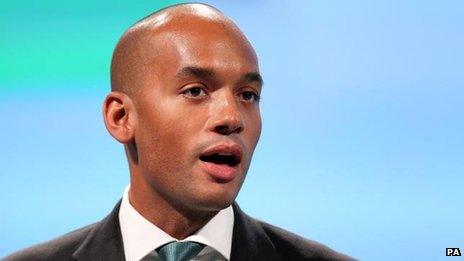Labour plays the Europe card to woo business
- Published
- comments

Chuka Umunna wants to demonstrate that Labour is not anti-business
In the era of the Cold War, there was a joke that to make up for being late for the last two world wars, America was going to make sure it was bang on time for the next one.
Labour appears to be adopting a similar attitude to the next big business debate: Europe and Britain's relationship with it.
After complaints that the main political parties were slow to pick up on widespread concerns among businesses that Scottish independence would be bad for their operations, Labour is ensuring that they reveal their "pro-business" credentials on the European Union well ahead of a possible referendum in 2017.
Today Chuka Umunna, the shadow business secretary, will take to the podium at the Labour Party conference alongside Robin Southwell, the UK head of Airbus.
Mr Southwell is a firm supporter of Britain's continuing membership of the EU and is one of David Cameron's "business ambassadors".
He will say that Britain's future is best served as a paid-up member of the EU.
Mr Umunna hopes that by having Mr Southwell with him during the main business speech at the Labour Party conference, the inference will be clear.
Businesses might by antsy with Labour over issues like energy market reform and the minimum wage - which the party announced at the weekend it wants to increase to £8 an hour by the end of the next Parliament - but on Europe, many larger businesses want a relentlessly pro-EU agenda.
As Sir Mike Rake, president of the CBI, chairman of BT and deputy chairman of Barclays, told me last week, one of biggest worries about possible Scottish independence was that with separation the chances of Britain leaving the EU would also increase.
Not only is Scotland slightly more sympathetic to Europe in terms of public support, it is a lot more pro-European when it comes to Members of Parliament.
As a further example of where the weight of business thinking is among many global corporates, when I travelled to Japan last autumn - home to the car manufacturers that have bought hundreds of thousands of jobs to the UK - there was bafflement and consternation that Britain could even flirt with an exit.
Of course there are many business leaders who would like to see Britain out of the Europe Union if there are not meaningful reforms. One of the most powerful is Lord Wolfson, the chief executive of Next and known to be very close to the chancellor.
Businesses that are sceptical about the European Union believe that with a different trade relationship, Britain would be better positioned economically, with fewer regulations holding growth back.
It would also force the UK to become more outward facing, building new trade alliances with the Commonwealth, the Americas and Asia.
Mr Umunna does not agree that exiting the EU would have a significant upside.
And when it comes to Labour's pro-business offer, his message is aimed squarely at the global corporations like Airbus that view the threat of Britain outside the EU with trepidation.